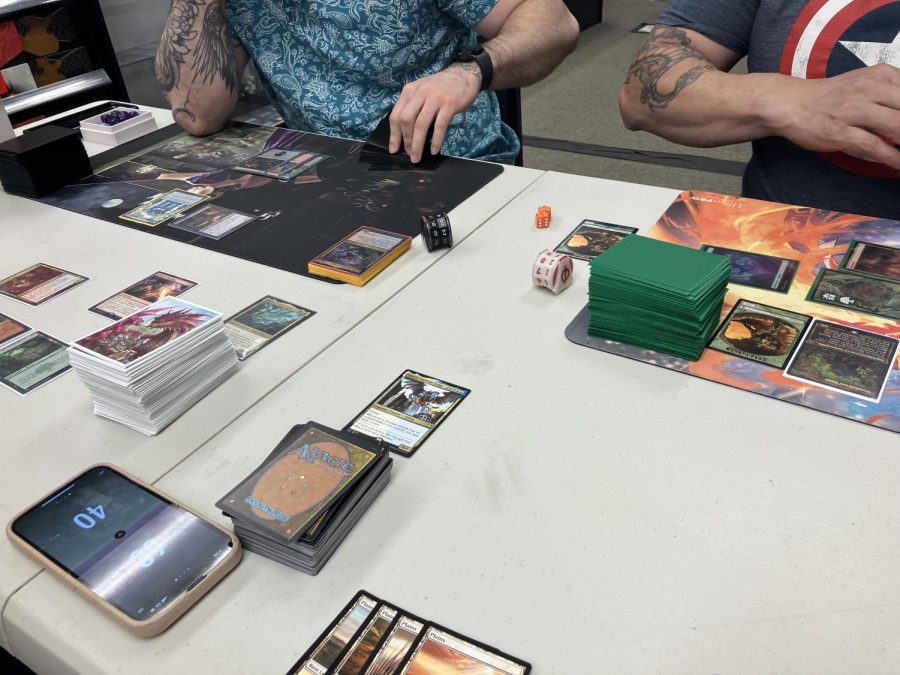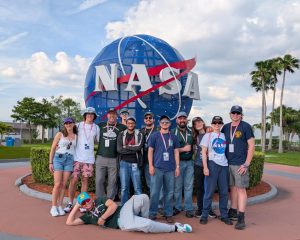Backyard Magic: An In-depth Look At “Magic: The Gathering’s” Most Popular Format
Its not just about the cards you have but navigating against who you are essentially having a good time with.
June 5, 2023
Modern “Geek-culture” has shed the large-framed glasses and social awkwardness stereotypes it was tagged with by ‘80s and ‘90s cinema. Today, if you’re a geek, you have an abundance of gaming choices that have transcended into all facets of pop culture. While “Dungeons and Dragons” is an involved TTRPG (tabletop role-playing game), that has largely been revitalized by the Netflix, sci-fi/horror drama, “Stranger Things,” game publishers Wizards Of The Coast, have been experiencing a large boom on their other game, “Magic: The Gathering.”
For those who have only heard of the name or, are unfamiliar with the concept altogether, “Magic: The Gathering” is a tabletop, collectable-card game created by mathematician Richard Garfield in 1993. Known in the ‘90s for its large tournament formats, underground fanaticism and even getting some coverage on “ESPN”, the game has experienced a number of popularity spikes only garnering that much more attention with every new format.
The point of the game is simple; reduce your opponent’s life points to 0 using a combination of creature cards, instant spell cards, enchantments, artifacts and land cards, that act as the catalyst for summoning all of the previously mentioned card types.
In the late ‘90s, most comic shops were already branching out beyond the realm of comics and had a large “magic” selection available for incoming regular customers. In the early 2000s, “Magic: The Gathering” began shifting its focus to new players and releasing cards to garner attention for what became known as “Friday Night Magic” – a “Magic” event that focused on the social aspect of magic, not the competition. Little did they know this shift would transform into the epicenter of the “Magic” scene.. With both comic and game shops holding weekly events, “Magic: The Gathering” became one of the most popular trading card games of the ‘90s with its first large-scale event in Feb. 1996; “Magic: The Gathering; The Black Lotus Pro Tour.”
Step into the realm of Geek Inc. Comics in Carol Stream, Ill. and you’ll be greeted by the shop attendants, Mike or Jeff. Unlike your typical encounter at a game shop, where a request for helping constructing a deck to play “Commander” would lead to a sales pitch to get you to buy as many cards as your cash can buy, Mike and Jeff proved to be a refreshing exception, asking how I wanted to play and what I already knew about the game.Being a veteran player of “Magic: the Gathering,” or “Magic” from my early teen years, I had to relearn some of the mechanics, encompassing new rules, new additions and a ton of new cards.
I was misplaced in an element I once found familiarity in. However that did not deter me from forgetting the stresses of the week and investing whole heartedly into a game with some new friends. Among some of my newly acquired cards, were newly acquired acquaintances who sat me down in order to learn to play the game.
The assembly of my new “commander” deck was a phenomenon that warmed my heart to the core and gave me a newfound appreciation for the community of “Magic:The Gathering.” I had numerous individuals opening up binders upon binders of cards, pulling out card after card and simply offering them to be able to foundationally build a deck from a sliver of hope I offered in potential from my older cards. It took about 80 minutes to build a 100-card deck.
As I was reshuffling my cards, I was welcomed into a small pod of people who not only aided in building my deck, but who purposefully chose to play with a deck they knew was not a competitive or aggressive deck to play. I was baptised back into Magic with a game played purely for the joy of it. . My play pod consisted of 4 spirited individuals who helped me assemble my deck, Carlos Soberanis, Juan De Leon, and an absolutely lovely player who did not wish to be quoted, but mentioned in all her glory.
The game itself took about 90 minutes to finish,and most of the game was spent laughing and casually strategizing with competitors.
For Soberanis, the Commander style of Magic goes beyond the qualities of a typical tabletop game.
“Magic is a game more than just cards,” Soberanis said, “It’s a test against yourself, against three other players. Its not just about the cards you have but navigating against who you are essentially having a good time with.”
De Leon agreed that the freedom of the Commander style is what draws people in.
“Magic The Gathering is two parts,” De Leon said. “The magic is the creative part, the uniqueness of what you are able to build and the decks that allow you to enjoy how you are playing. But the gathering, well, it’s more of the social aspect. Its both the Magic part, and the gathering.”
After about 45 minutes of cards being summoned, mechanics being initiated, and strategies actualizing, I was the first to have their life points drained to zero, but having a better understanding of not just playing the game, but what De Leon and Soberanis had touched on. The game may be competitive, but it doesn’t have to be miserable. There is enjoyment to be found in synchronous competition, but still maintaining general hospitality when welcoming new players. I may have lost, but what I gained was a pod of players that will welcome me to their table not just as an equally matching opponent, but to help me build a stronger deck and give me pointers based on the type of player I am. Acceptance of not just me as a player, but me as another individual at the table.
Wizards Of The Coast, Publishers of both “Dungeons and Dragons” and “Magic: The Gathering, have a Commander Night Finder” on their website. Geek Inc. Comics is located at 994 Army Trail Rd, Carol Stream, IL 60188. Not only are they available to supply you with all your Dungeons and Dragons and Magic: The Gathering needs, but they also carry an expansive comic library as well as manga.


















